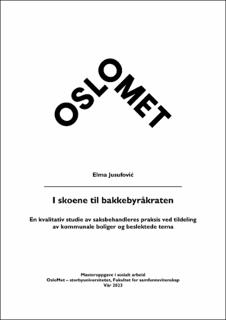| dc.contributor.advisor | Sørvoll, Jardar | |
| dc.contributor.author | Jusufović, Elma | |
| dc.date.accessioned | 2023-10-18T07:09:25Z | |
| dc.date.available | 2023-10-18T07:09:25Z | |
| dc.date.issued | 2023 | |
| dc.identifier.uri | https://hdl.handle.net/11250/3097161 | |
| dc.description.abstract | Denne masteroppgaven belyser bakkebyråkratens subjektive opplevelser og forståelse av sitt arbeid med tildeling av kommunale utleieboliger i Norge. Oppgaven er tilknyttet BOVEL sitt pågående forskningsprosjekt om den kommunale utleiesektoren (2021-2024). Mitt bidrag til dette prosjektet er en kvalitativ studie hvor jeg har intervjuet åtte saksbehandlere som har direktekontakt med søkere av kommunal bolig, og hvor de ansattes profesjon, utdanningsbakgrunn og skjønn blir tatt på alvor som teoretiske begreper og empiriske realiteter. Det siste er et nytt bidra til den sosialpolitiske orienterte boligforskningen. Profesjon og skjønn er ikke mye anvendte begreper i denne forskningslitteraturen, selv om det kan være relevant for å forstå tildelingen av boligsosiale gode som kommunale boliger.
Empirien i oppgaven analyseres ved hjelp av Braun og Clarke (2006) sin beskrivelse av de metodiske stegene i en tematisk analyse. Studien besvarer to problemstillinger: «hva opplever saksbehandlere som tildeler kommunale boliger som de største utfordringene i arbeidet sitt?» og «hvilken betydning har saksbehandlernes utdanningsbakgrunn for deres egne opplevelser og vurderinger knyttet til tildeling av kommunale boliger?».
Intervjumateriale illustrerer flere utfordringer knyttet til saksbehandlingen av søknader om kommunal bolig, tildeling av bolig og beboerne botid. For det første synes saksbehandlerne det er utfordrende å måtte forholde seg til kommunens retningslinjer samtidig som en skal vurdere søknader ut ifra eget skjønn. I tillegg opplever de det som utfordrende å tilrettelegge for søkernes brukermedvirkning grunnet mangelen på kommunale boliger – som bidrar til å gjøre rommet for påvirkning lite for søkeren med hensyn til for eksempel valg av bosted. For det andre utgjør knappheten på boliger, sammen med den pågående ukrainske flyktningstrømmen og en sterk geografisk konsentrert boligmasse, prosessen med tildeling av bolig utfordrende for saksbehandlerne. For det tredje opplever saksbehandlerne at det er vanskelig å praktisere idealet om beboergjennomstrømming, når man samtidig bør vise hensyn til beboernes bostabilitet. Saksbehandlerne uttrykker også at flere boligkontor mangler tilbud om bo-oppfølging, noe som påvirker beboernes mulighet til å komme seg videre i boligkarrieren negativt. Dette skaper en opphoping av gjengangere som på nytt og på nytt blir bosatt i kommunale boliger.
Videre indikerer studien at de strukturelle rammene i den kommunale utleiesektoren og personlig egenhet i større grad påvirker saksbehandlernes opplevelse og vurderinger enn deres utdanningsbakgrunn. Saksbehandlernes utdanning kan påvirke deres forståelse av brukermedvirkning og hvordan fornyelse av leiekontrakter vurderes, men funnene viser at dette i større grad påvirkes av saksbehandlernes personlige vurderinger uavhengig av utdanningsbakgrunn og grunntrekk i den kommunale utleiesektoren som for eksempel knapphet på boliger, tidspress og Ukrainasituasjonen. Imidlertid kommer det frem i analysen at utdanningsbakgrunn i enkelte tilfeller kan spille en viktig rolle ved saksbehandlernes skjønnsvurderinger. | en_US |
| dc.description.abstract | This master’s thesis is an analysis of the street-level bureaucrats subjective experiences and understanding of their work with the allocation of municipal rented social housing in Norway. The thesis was written as part of HOUSINGWEL’s ongoing research project on social housing (2021-2024). My contribution to this project is a qualitative study, where I have interviewed eight case managers who have direct contact with applicants for municipal housing. The study takes profession and discretion seriously as theoretical concepts and empirical realities. This is novelty in Norwegian social housing research.
The empirical data has been analysed in accordance with Braun and Clarke’s (2006) approach to thematic analysis. The study answers two research questions: “what do case managers who allocate municipal housing experience as the biggest challenges in their work?” and “how does the case managers’ educational background affect their experiences and assessments related to the allocation of municipal housing?”.
The interview material points to several challenges linked to the processing of applications for municipal social housing, the allocation of housing and the residents’ length of stay. Firstly, the case managers find it challenging to evaluate applications in accordance with the municipality’s guidelines, at the same time as having to assess applications based on their own discretion. In addition, they experience challenges with accommodating the applicants’ user participation due to the shortage of municipal housing, as this narrows the scope of the applicants’ freedom of choice. Second, the lack of municipal housing, together with the ongoing Ukrainian refugee crisis and a highly geographically concentrated municipal housing stock, constitutes a challenge in the process of housing allocation. Thirdly, the case managers experience difficulties with practicing the ideal of stimulating tenant turnover, while at the same time safeguarding some resident’s residential stability. The case managers also express that several housing authorities do not have the resources to help tenants that need assistance, which affects the resident’s ability to make progress in their housing career. This creates an accumulation of regulars who are constantly settled and resettled in municipal housing.
Furthermore, the study shows that the structural context of the municipal housing sector and personal characteristics (independent of educational background) has a greater influence on the case managers’ experiences and assessments than their educational background. The case managers’ education may affect their understanding of user participation and how lease renewals are assessed, but the findings show that this is to a greater extent influenced by the case mangers’ personal characteristics and structural conditions of the municipal housing sector, such as housing shortages, time pressures and the Ukrainian refugee situation. However, the analysis reveals that educational background may nonetheless play an important role in the case managers’ discretionary assessments in some cases. | en_US |
| dc.language.iso | nob | en_US |
| dc.publisher | OsloMet-Storbyuniversitetet | en_US |
| dc.subject | Kommunale boliger | en_US |
| dc.subject | Brukermedvirkning | en_US |
| dc.subject | Byråkrati | en_US |
| dc.title | I skoene til bakkebyråkraten: En kvalitativ studie av saksbehandleres praksis ved tildeling av kommunale boliger og beslektede tema. | en_US |
| dc.type | Master thesis | en_US |
| dc.description.version | publishedVersion | en_US |
